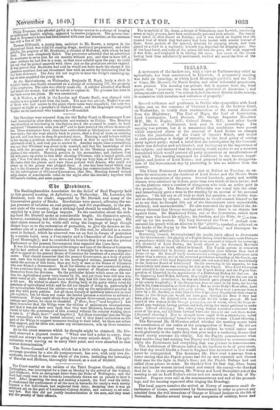vat %kabinet%
The Buckinghamshire Association for the Relief of Real Property held its first general meeting, at Aylesbury, on Wednesday. Mr. Lowndes, the President, took the chair; supported by Mr. Disraeli and many of the Conservative gentry of Bucks. Resolutions were passed, affirming the un- just pressure of taxation on real property, and the expediency, in the pre- sent state of the country, that a sinking-fund should be established, to be supplied by a duty on foreign imports. To the resolution about the sink- ing-fund Mr. Disraeli spoke at considerable length; his discursive speech, however, containing but little direct allusion to his immediate topic. His chief object seemed to be, while still using the language of large though distant hope as to the restoration of protection, to give the farmers an im- mediate aim of a palliative character. To this end, he alluded to a move- ment in Ireland, which he observed was set on foot in favour of protection by a certain Lord, once a Free-trader and a Chancellor of the Exchequer [Lord Monteagle] ; and he reminded his hearers that it was not the present Parliament or the present Government that repealed the Corn-laws.
It was his business to understand the temper and tone of the House of Commons, and he had arrived at the conclusion that it wouidbe by no means is desperate effort to appeal to the present House of Commons for measures of a remedial cha- racter. They should remember that the present Government, as a body of public men, were less violently devoted to the newfangled notions, honoured by being called the system of free trade, than any body of men in the House of Commons who ever formed a Government. In all the debates on the new commercial policy, it was a curious thing to observe the large number of Members who absented themselves from the divisions. On the particular debate which arose on his mo- tion, the Agricultural party were beaten by 90, and yet there were 120 men who never voted at all: these would have voted if they had felt then the pinch which is felt now. He wished to absorb this floating body in the party which voted for measures of agricultural relief; and he did not despair of doing so, particularly if the agriculturists followed his advice—not to mix up the agricultural question in any way with party politica. Let all those directly or indirectly interested in land join together, but let them not make the landed question a machine to subvert a Government. If they could obtain from thepresent Government measures of ad- vantage and justice, let them be thankful. ("Hear, hear Pend laughter.) Let them remember that the Whigs were the victims of unfortunate circumstances, and that it was not their own fault that they were Ministers, because they were forced to take the government of this country without the country wishing them to take it. ("Hear, hear!" and laughter.) Let them remember that the Whigs had sympathies with the landed interest; and if they found inclination on the part of the Whigs to support measures tending to their relief, let them not refuse that support, and let them not, under any circumstances, mix up these measures with party politics. As to the exact measure which he thought might be obtained, Mr. Dis- raeli observed a piquant reserve. " When one had a point to carry, time could not always be spared for going into every minute detail. The agri- culturists were moving on to carry their point, and were absorbed in that
master-determination." • The Town-Council of Leeds, which but a little while ago dismissed the sewerage question by a sine die postponement, has now, with only two dis- sentients, resolved to have the whole of the town, including the townships of Runlet and Holbeee, thoroughly drained, at a cost of 80,0001.
The Court-martial on the soldiers of the Third Dragoon Guards, sitting at Nottingham, was interrupted for a time on Monday by the arrival of the Colonel, Earl Cathcart, with an autograph letter from the Doke of Wellington; and the Earl had every man in the barracks immediately drawn out on parade to hear it read. After inspecting the men and making a speech, the Earl read the letter. It condemned the confinement of all the men in barracks for nearly a week merely because a few individuals had.neglected their duty; declaring that it was an arbitrary-act on the part of Lieutenant-Colonel Arthur, and contrary to all mili- tary law. But this did not justify insubordination in the men, and they must Pay the penalty of their offence& The household of Mr. Amos, a farmer of Witnesham, near Ipswich, numbering seven or eight persons, have been accidentally poisoned with arsenic. The family were taken ill after dinner on Sunday; and it was found on inquiry that the roasted veal of which they had eaten had been basted with arsenic instead of flour. Some packets of the mineral, obtained for steeping wisest, had been placed on a shelf in a cupboard; beneath was deposited the dripping-pan. One of the bags burst, and some of the poison fell into the pan; the cook supposed it was flour, and employed it in bating the meat. The cause of the Maass having been thus satisfactorily ascertained, medical aid saved the lives of the sufferers.


























 Previous page
Previous page